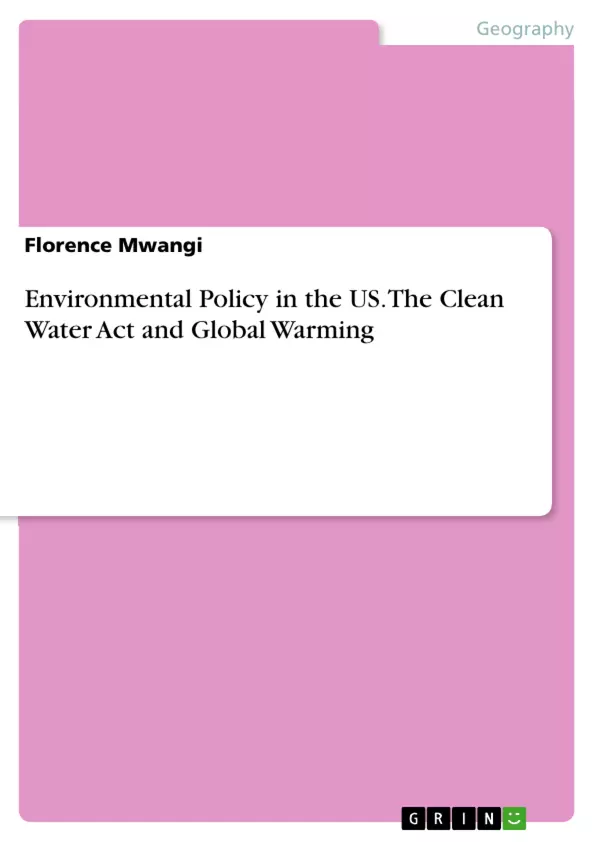This term paper gives an overview of the U.S. Clean Water Act, its amendments as well as its economic and environmental impacts. Further, the topic of global warming is addressed and the author argues that, in fact, science does not support the theory of manmade climate.
Inhaltsverzeichnis (Table of Contents)
- U.S. environmental law (Clean Water Act)
- The economic impact of the Clean Water Law
- Improvement of Clean Water Act on the environment or situation
- Do you think that sound science has proven that global warming is a credible threat or not?
- Should the United States adopt additional policies or laws to curb greenhouse gas emissions?
- Conclusion
Zielsetzung und Themenschwerpunkte (Objectives and Key Themes)
This paper explores the Clean Water Act and its impact on the environment, economy, and society. It examines the act's provisions, its effectiveness in improving water quality, and the economic benefits associated with its implementation. The paper also touches upon the issue of global warming and its potential impact on the environment.
- The Clean Water Act and its historical development
- The economic impact of environmental regulations
- The effectiveness of the Clean Water Act in improving water quality
- The debate surrounding global warming and its scientific evidence
- The need for additional policies to address climate change
Zusammenfassung der Kapitel (Chapter Summaries)
- Chapter 1: U.S. environmental law (Clean Water Act): This chapter provides an overview of the Clean Water Act, its history, and its key provisions. It discusses the Act's objective of achieving fishable and swimmable waters, the regulations it imposes on pollutant discharges, and the permit system it utilizes.
- Chapter 2: The economic impact of the Clean Water Law: This chapter explores the economic consequences of the Clean Water Act. It argues that environmental regulations, including the Clean Water Act, can create employment opportunities and stimulate economic growth. The chapter highlights the benefits of clean water, such as increased tourism and recreation, and the positive impact on health and productivity.
- Chapter 3: Improvement of Clean Water Act on the environment or situation: This chapter examines the environmental improvements achieved through the implementation of the Clean Water Act. It discusses the success of the Act in reducing pollutant discharges, improving water quality, and restoring degraded water bodies. The chapter also cites evidence of the Act's effectiveness in improving the overall environment.
- Chapter 4: Do you think that sound science has proven that global warming is a credible threat or not?: This chapter explores the debate surrounding global warming and its scientific evidence. It presents different viewpoints on the issue, including those who believe that global warming is a significant threat and those who argue that more research is needed. The chapter discusses the potential impacts of climate change and the need for further investigation.
Schlüsselwörter (Keywords)
Clean Water Act, environmental regulation, water quality, pollution, economic impact, global warming, climate change, scientific evidence, environmental policy.
Frequently Asked Questions
What is the U.S. Clean Water Act?
The Clean Water Act is the primary federal law in the United States governing water pollution, aiming to restore and maintain the chemical, physical, and biological integrity of the nation's waters.
What are the economic impacts of the Clean Water Act?
Environmental regulations like the Clean Water Act can stimulate economic growth by creating jobs in the environmental sector and boosting industries like tourism and recreation that rely on clean water.
How effective has the Act been in improving the environment?
The Act has been highly successful in reducing pollutant discharges, restoring degraded water bodies, and significantly improving overall water quality across the United States.
What is the author's stance on global warming?
The author presents a controversial viewpoint, arguing that science does not fully support the theory of man-made climate change and questioning the credibility of global warming as a threat.
Should the U.S. adopt more laws to curb greenhouse gases?
The paper explores this debate, contrasting the need for environmental protection with scientific uncertainty and the potential economic costs of additional regulations.
What is the "fishable and swimmable" objective?
It is a key goal of the Clean Water Act, stating that wherever attainable, water quality should provide for the protection of fish and wildlife and allow for recreational activities in the water.
- Quote paper
- Florence Mwangi (Author), 2015, Environmental Policy in the US. The Clean Water Act and Global Warming, Munich, GRIN Verlag, https://www.hausarbeiten.de/document/306482


